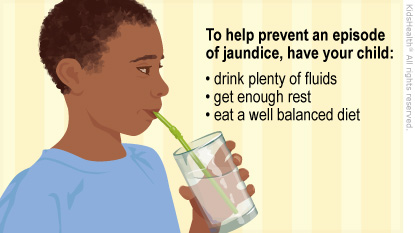Gilbert's Syndrome: How to Care for Your Child
Gilbert's syndrome is a harmless liver condition. People with Gilbert's syndrome have episodes of jaundice (yellowing of the skin and/or whites of the eyes). The jaundice happens because the body doesn't properly process bilirubin (a yellowish substance made during the breakdown of red blood cells) and it builds up. This build-up is more likely to happen during illness, stress, dehydration, menstrual periods, while taking some medicines, or when not eating enough.


-
Check with your health care provider before giving your child any new medicines.
-
If you give acetaminophen (such as Tylenol® or a store brand), do not give more than the recommended amount.
-
Your child can do all normal activities.
-
To prevent an episode of jaundice, help your child:


Why do people with Gilbert's syndrome get high bilirubin levels? Normally when blood goes through the liver, the liver changes the bilirubin into a form that can leave the body in poop and pee. But in people with Gilbert's (pronounced zheel-BAIR) syndrome, an enzyme is missing and bilirubin is not processed normally. When the bilirubin builds up in the blood, it leads to jaundice.
How is Gilbert's syndrome diagnosed? Health care providers diagnose Gilbert's syndrome by measuring the amount of bilirubin in the blood. They also do other blood tests or an ultrasound of the liver to make sure there is no other cause of the increased bilirubin.
How do people get Gilbert's syndrome? Gilbert's syndrome is passed down in the genes from parents to children. A child usually needs to get a copy of the gene from each parent to have Gilbert's syndrome.